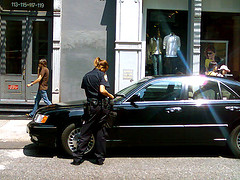Article by Daniel A. Levy, Esq.
(UPDATED April 26, 2018)
On a pretty regular basis, clients come into my office for a criminal matter and I find out later that they likely would never have been criminally charged if they simply declined to talk to the police. And it happens more often than one would think. This is because most folks here in New Jersey mistakenly believe that they are required to talk to the police. They are not.
This is how the scenario typically plays out: A police officer sees a person who looks like they may be up to no good. The officer doesn’t know if the suspect committed a crime or not, but they just have a hunch that something is going on. So the police office tries to get the person talking. Maybe the person starts acting nervous. Maybe the person has no good reason for why they are at a certain place at a certain time. But in any case, the officer is trained to get the person talking so that they can gather some information. Most of the time, the person voluntarily talks to the officer. In many cases, there’s no evidence of a crime and the conversation ends. But in other cases, the person provides the officer with all sorts of admissions of criminal activity and they are arrested. In fact, just the other day I was in court on a case with 4 defendants. The police had literally no evidence whatsoever – the officer just approached someone and said, “what are you doing here?” and the response was, essentially, “we’re here committing a crime – sorry about that.”
The bottom line is, you generally have absolutely no obligation to speak to police, especially if they are investigating you. However, this does not mean that you can lie to police. Lying could result in a criminal charge for obstructing justice and/or hindering the apprehension of a suspect (if the police are trying to catch someone other than you). So what should you say if police start questioning you? Simple: “I choose not to answer. Am I free to leave?”
This is very important for a couple of reasons. First, stating “I choose not to answer” isn’t lying – so you can’t be charged for obstruction – and it isn’t something that can be used against you later because the rule is that declining to speak with police cannot be used against you at a trial. Second, asking if you are free to leave will give you an important piece of information. If the officer does not let you go, you are effectively in custody. The officer considers you a criminal suspect. Also, the officer will not be allowed to keep you in custody unless there is probable cause to believe that you committed a crime. And refusing to answer questions and asking to leave is not probable cause. Therefore, asking if you can leave will make the officer choose whether or not to detain you and continue to investigate you. And the police know that they cannot arbitrarily detain people just based on a hunch. In fact, if someone is detained on a hunch and evidence is found later to suggest that they were involved in a crime, that evidence could be thrown out if the detention was not based on probable cause.
Please note that many interactions with the police are due to the fact that the police suspect that the person that they are speaking with committed a crime. There is no sense in providing the police with the evidence that they need to arrest you. Rather, you should call a lawyer to discuss the situation so that your rights are protected.


